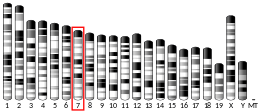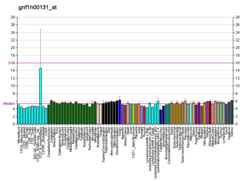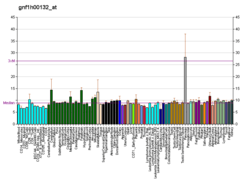EEF2K
Eukaryotic elongation factor-2 kinase (eEF-2 kinase or eEF-2K), also known as calmodulin-dependent protein kinase III (CAMKIII) and calcium/calmodulin-dependent eukaryotic elongation factor 2 kinase,[5] is an enzyme that in humans is encoded by the EEF2K gene.[6][7]
Function
eEF-2 kinase is a highly conserved protein kinase in the calmodulin-mediated signaling pathway that links multiple up-stream signals to the regulation of protein synthesis. It phosphorylates eukaryotic elongation factor 2 (EEF2) and thus inhibits the EEF2 function.[6][8]
Activation
The activity of eEF-2K is dependent on calcium and calmodulin. Activation of eEF-2K proceeds by a sequential two-step mechanism. First, calcium-calmodulin binds with high affinity to activate the kinase domain, triggering rapid autophosphorylation of Thr-348.[9][10] In the second step, autophosphorylation of Thr-348 leads to a conformational change in the kinase likely supported by the binding of phospho-Thr-348 to an allosteric phosphate binding pocket in the kinase domain. This increases the activity of eEF-2K against its substrate, elongation factor 2.[10]
eEF-2K can gain calcium-independent activity through autophosphorylation of Ser-500. However, calmodulin must remain bound to the enzyme for its activity to be sustained.[9]
Clinical significance
The activity of this kinase is increased in many cancers and may be a valid target for anti-cancer treatment.[6][11]
It is also suggested that eEF-2K may play a role the rapid anti-depressant effects of ketamine through its regulation of neuronal protein synthesis.[12]
Cancer
eEF-2K expression is often upregulated in cancer cells, including breast and pancreatic cancers and promotes cell proliferation, survival, motility/migration, invasion and tumorigenesis.[13][14]
References
- ENSG00000284161 GRCh38: Ensembl release 89: ENSG00000103319, ENSG00000284161 - Ensembl, May 2017
- GRCm38: Ensembl release 89: ENSMUSG00000035064 - Ensembl, May 2017
- "Human PubMed Reference:". National Center for Biotechnology Information, U.S. National Library of Medicine.
- "Mouse PubMed Reference:". National Center for Biotechnology Information, U.S. National Library of Medicine.
- "EEF2K Gene (Protein Coding)". GeneCards. Weizmann Institute of Science. Retrieved 4 November 2015.
Aliases for EEF2K Gene
Eukaryotic Elongation Factor 2 Kinase
Calcium/Calmodulin-Dependent Eukaryotic Elongation Factor 2 Kinase
EEF-2 Kinase
EC 2.7.11.20
EEF-2K
Calcium/Calmodulin-Dependent Eukaryotic Elongation Factor-2 Kinase
Calmodulin-Dependent Protein Kinase III - "Entrez Gene: EEF2K eukaryotic elongation factor-2 kinase".
- Ryazanov AG, Ward MD, Mendola CE, Pavur KS, Dorovkov MV, Wiedmann M, Erdjument-Bromage H, Tempst P, Parmer TG, Prostko CR, Germino FJ, Hait WN (May 1997). "Identification of a new class of protein kinases represented by eukaryotic elongation factor-2 kinase". Proceedings of the National Academy of Sciences of the United States of America. 94 (10): 4884–9. doi:10.1073/pnas.94.10.4884. PMC 24600. PMID 9144159.
- Ryazanov AG, Spirin AS (Oct 1990). "Phosphorylation of elongation factor 2: a key mechanism regulating gene expression in vertebrates". The New Biologist. 2 (10): 843–50. PMID 1964087.
- Tavares CD, O'Brien JP, Abramczyk O, Devkota AK, Shores KS, Ferguson SB, Kaoud TS, Warthaka M, Marshall KD, Keller KM, Zhang Y, Brodbelt JS, Ozpolat B, Dalby KN (Mar 2012). "Calcium/calmodulin stimulates the autophosphorylation of elongation factor 2 kinase on Thr-348 and Ser-500 to regulate its activity and calcium dependence". Biochemistry. 51 (11): 2232–45. doi:10.1021/bi201788e. PMC 3401519. PMID 22329831.
- Tavares CD, Ferguson SB, Giles DH, Wang Q, Wellmann RM, O'Brien JP, Warthaka M, Brodbelt JS, Ren P, Dalby KN (Aug 2014). "The molecular mechanism of eukaryotic elongation factor 2 kinase activation". The Journal of Biological Chemistry. 289 (34): 23901–16. doi:10.1074/jbc.m114.577148. PMC 4156036. PMID 25012662.
- Leprivier G, Remke M, Rotblat B, Dubuc A, Mateo AR, Kool M, Agnihotri S, El-Naggar A, Yu B, Somasekharan SP, Faubert B, Bridon G, Tognon CE, Mathers J, Thomas R, Li A, Barokas A, Kwok B, Bowden M, Smith S, Wu X, Korshunov A, Hielscher T, Northcott PA, Galpin JD, Ahern CA, Wang Y, McCabe MG, Collins VP, Jones RG, Pollak M, Delattre O, Gleave ME, Jan E, Pfister SM, Proud CG, Derry WB, Taylor MD, Sorensen PH (May 2013). "The eEF2 kinase confers resistance to nutrient deprivation by blocking translation elongation". Cell. 153 (5): 1064–79. doi:10.1016/j.cell.2013.04.055. PMC 4395874. PMID 23706743.
- Monteggia LM, Gideons E, Kavalali ET (Jun 2013). "The role of eukaryotic elongation factor 2 kinase in rapid antidepressant action of ketamine". Biological Psychiatry. 73 (12): 1199–203. doi:10.1016/j.biopsych.2012.09.006. PMC 3574622. PMID 23062356.
- Tekedereli I, Alpay SN, Tavares CD, Cobanoglu ZE, Kaoud TS, Sahin I, Sood AK, Lopez-Berestein G, Dalby KN, Ozpolat B (Mar 20, 2012). "Targeted silencing of elongation factor 2 kinase suppresses growth and sensitizes tumors to doxorubicin in an orthotopic model of breast cancer". PLoS One. 7 (7): e41171. doi:10.1371/journal.pone.0041171. PMC 3401164. PMID 22911754.
- Ashour AA, Abdel-Aziz AA, Mansour AM, Alpay SN, Huo L, Ozpolat B (Jan 22, 2014). "Targeting elongation factor-2 kinase (eEF-2K) induces apoptosis in human pancreatic cancer cells". Apoptosis. 19 (1): 241–58. doi:10.1007/s10495-013-0927-2. PMID 24193916.
Further reading
- Nairn AC, Palfrey HC (Dec 1987). "Identification of the major Mr 100,000 substrate for calmodulin-dependent protein kinase III in mammalian cells as elongation factor-2". The Journal of Biological Chemistry. 262 (36): 17299–303. PMID 3693353.
- Redpath NT, Price NT, Severinov KV, Proud CG (Apr 1993). "Regulation of elongation factor-2 by multisite phosphorylation". European Journal of Biochemistry / FEBS. 213 (2): 689–99. doi:10.1111/j.1432-1033.1993.tb17809.x. PMID 8386634.
- Pavur KS, Petrov AN, Ryazanov AG (Oct 2000). "Mapping the functional domains of elongation factor-2 kinase". Biochemistry. 39 (40): 12216–24. doi:10.1021/bi0007270. PMID 11015200.
- Diggle TA, Subkhankulova T, Lilley KS, Shikotra N, Willis AE, Redpath NT (Feb 2001). "Phosphorylation of elongation factor-2 kinase on serine 499 by cAMP-dependent protein kinase induces Ca2+/calmodulin-independent activity". The Biochemical Journal. 353 (Pt 3): 621–6. doi:10.1042/0264-6021:3530621. PMC 1221608. PMID 11171059.
- Knebel A, Morrice N, Cohen P (Aug 2001). "A novel method to identify protein kinase substrates: eEF2 kinase is phosphorylated and inhibited by SAPK4/p38delta". The EMBO Journal. 20 (16): 4360–9. doi:10.1093/emboj/20.16.4360. PMC 125581. PMID 11500363.
- Wang X, Li W, Williams M, Terada N, Alessi DR, Proud CG (Aug 2001). "Regulation of elongation factor 2 kinase by p90(RSK1) and p70 S6 kinase". The EMBO Journal. 20 (16): 4370–9. doi:10.1093/emboj/20.16.4370. PMC 125559. PMID 11500364.
- Arora S, Yang JM, Craft J, Hait W (May 2002). "Detection of anti-elongation factor 2 kinase (calmodulin-dependent protein kinase III) antibodies in patients with systemic lupus erythematosus". Biochemical and Biophysical Research Communications. 293 (3): 1073–6. doi:10.1016/S0006-291X(02)00324-8. PMID 12051769.
- Wistow G, Bernstein SL, Wyatt MK, Fariss RN, Behal A, Touchman JW, Bouffard G, Smith D, Peterson K (Jun 2002). "Expressed sequence tag analysis of human RPE/choroid for the NEIBank Project: over 6000 non-redundant transcripts, novel genes and splice variants". Molecular Vision. 8: 205–20. PMID 12107410.
- Knebel A, Haydon CE, Morrice N, Cohen P (Oct 2002). "Stress-induced regulation of eukaryotic elongation factor 2 kinase by SB 203580-sensitive and -insensitive pathways". The Biochemical Journal. 367 (Pt 2): 525–32. doi:10.1042/BJ20020916. PMC 1222910. PMID 12171600.
- Browne GJ, Finn SG, Proud CG (Mar 2004). "Stimulation of the AMP-activated protein kinase leads to activation of eukaryotic elongation factor 2 kinase and to its phosphorylation at a novel site, serine 398". The Journal of Biological Chemistry. 279 (13): 12220–31. doi:10.1074/jbc.M309773200. PMID 14709557.
- Browne GJ, Proud CG (Apr 2004). "A novel mTOR-regulated phosphorylation site in elongation factor 2 kinase modulates the activity of the kinase and its binding to calmodulin". Molecular and Cellular Biology. 24 (7): 2986–97. doi:10.1128/MCB.24.7.2986-2997.2004. PMC 371112. PMID 15024086.
- Brill LM, Salomon AR, Ficarro SB, Mukherji M, Stettler-Gill M, Peters EC (May 2004). "Robust phosphoproteomic profiling of tyrosine phosphorylation sites from human T cells using immobilized metal affinity chromatography and tandem mass spectrometry". Analytical Chemistry. 76 (10): 2763–72. doi:10.1021/ac035352d. PMID 15144186.
- Li X, Alafuzoff I, Soininen H, Winblad B, Pei JJ (Aug 2005). "Levels of mTOR and its downstream targets 4E-BP1, eEF2, and eEF2 kinase in relationships with tau in Alzheimer's disease brain". The FEBS Journal. 272 (16): 4211–20. doi:10.1111/j.1742-4658.2005.04833.x. PMID 16098202.
- Kimura K, Wakamatsu A, Suzuki Y, Ota T, Nishikawa T, Yamashita R, Yamamoto J, Sekine M, Tsuritani K, Wakaguri H, Ishii S, Sugiyama T, Saito K, Isono Y, Irie R, Kushida N, Yoneyama T, Otsuka R, Kanda K, Yokoi T, Kondo H, Wagatsuma M, Murakawa K, Ishida S, Ishibashi T, Takahashi-Fujii A, Tanase T, Nagai K, Kikuchi H, Nakai K, Isogai T, Sugano S (Jan 2006). "Diversification of transcriptional modulation: large-scale identification and characterization of putative alternative promoters of human genes". Genome Research. 16 (1): 55–65. doi:10.1101/gr.4039406. PMC 1356129. PMID 16344560.
- Hait WN, Wu H, Jin S, Yang JM (2007). "Elongation factor-2 kinase: its role in protein synthesis and autophagy". Autophagy. 2 (4): 294–6. doi:10.4161/auto.2857. PMID 16921268.
- Beausoleil SA, Villén J, Gerber SA, Rush J, Gygi SP (Oct 2006). "A probability-based approach for high-throughput protein phosphorylation analysis and site localization". Nature Biotechnology. 24 (10): 1285–92. doi:10.1038/nbt1240. PMID 16964243.
- Olsen JV, Blagoev B, Gnad F, Macek B, Kumar C, Mortensen P, Mann M (Nov 2006). "Global, in vivo, and site-specific phosphorylation dynamics in signaling networks". Cell. 127 (3): 635–48. doi:10.1016/j.cell.2006.09.026. PMID 17081983.





